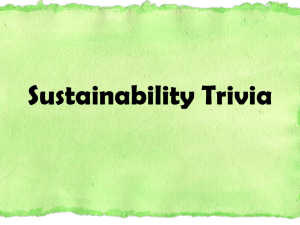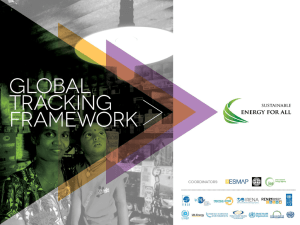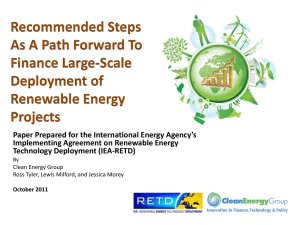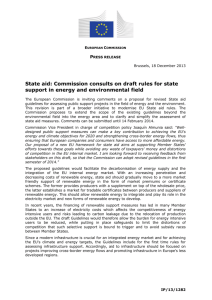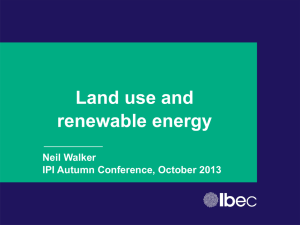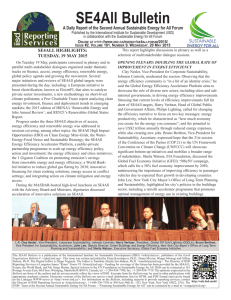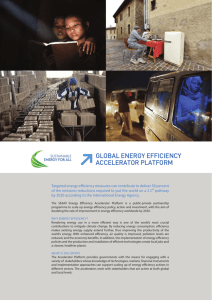Professional Report - the United Nations
advertisement
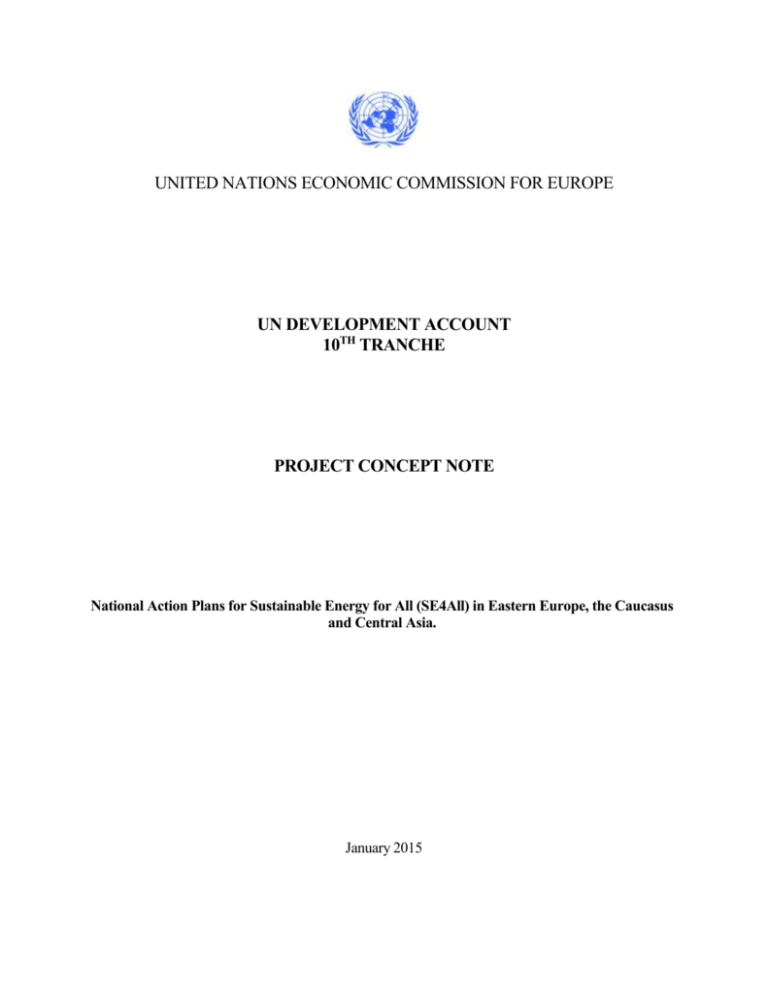
UNITED NATIONS ECONOMIC COMMISSION FOR EUROPE UN DEVELOPMENT ACCOUNT 10TH TRANCHE PROJECT CONCEPT NOTE National Action Plans for Sustainable Energy for All (SE4All) in Eastern Europe, the Caucasus and Central Asia. January 2015 (i) Title National Action Plans for Sustainable Energy for All (SE4All) in Eastern Europe, the Caucasus and Central Asia. (ii) Implementing entity and UN Secretariat partners UNECE will be the lead implementing agency. The implementing partner will be UNESCAP. The project will be implemented in collaboration with UNDESA and the Sustainable Energy for All (SE4ALL) Secretariat. (iii) Background The three objectives of the Sustainable Energy for All (SE4All) Initiative of the UN Secretary-General are ensuring universal access to modern energy services, doubling the global rate of improvement in energy efficiency and doubling the share of renewable energy in the global energy mix by 2030. The current draft sustainable development goals include the following directly related to energy: Ensuring equitable access to modern energy services for households and public services facilities, including access to adequate electricity supply and clean energy for cooking, health and hygiene is essential to fulfill basic human needs and enable sustainable development. However, access to modern energy services varies widely, and requires adequate investments from primary energy supply to final end users. All stakeholders should have fair access to the different segments of the energy markets. A broad view of access includes three aspects: (i) physical access, which is connection either to a gridbased service or to an off-grid solution; (ii) economic access, which is the ability to pay the cost of service; and (iii) quality of service – if systems are not properly maintained, then quality will deteriorate. Current available information does not permit proper assessment of national situations visà-vis access to modern energy services in any of these aspects, and it will be necessary to insure that proper data are gathered and reported. Improving energy efficiency is the famous low-hanging fruit that can contribute to energy security, a better environment, quality of life, and economic well-being for all. Energy efficiency is the best way of getting more out of our existing resources, supporting economic growth, and reducing the energy costs for all citizens. Despite the multiple benefits, improving energy efficiency remains elusive. Low energy tariff policies, subsidies, lack of information, and lack of investment capital for end-users are among the barriers to deployment of energy efficiency. Increased and sustained public investments in improving energy efficiency from source to use will be critically important. Attempts to improve energy efficiency fall short because of ill-conceived national policies that artificially lower energy prices and encourage wasteful consumption; production and consumption subsidies that distort markets; poorly managed housing stocks; inefficient land use management; barriers to new entrants; inadequate norms and standards; and incomplete statistics and information to manage energy use and track progress. In addition, there is a general lack of public awareness and education about the longterm economic and societal benefits of action to improve energy efficiency and industrial productivity. Investing in renewable energy is one way to reduce the carbon intensity of the energy sector. Renewable energy technologies are promoted for three principal interlinked reasons: (i) to reduce the environmental consequences of fossil fuel use; (ii) to improve energy security; and (iii) to encourage economic development, innovation, and high-tech manufacturing. These reasons are particularly relevant for developing regions, where much of the population lives in isolated rural communities that lack energy services and suffer from poor socio-economic conditions. Renewable energy is not the only way to address climate change and air pollution. While renewable energy penetration would be an important indicator of progress, sustainable energy policies could also explore the range of alternatives (such as improving the performance of fossil fuel technologies) for reducing the carbon intensity of the energy sector and reducing the environmental and social impacts caused by energy production and consumption and energy poverty. Wider uptake of renewables requires addressing barriers to fair competition with conventional technology without resorting to long-term subsidies, as well as implementing stable long-term energy policy frameworks in a future energy system context, and deploying innovative and targeted financial mechanisms. The lessons learned from past activities in UNECE countries with economies in transition, some of which are on-going, relate(d) to energy efficiency, advanced fossil fuel technologies, and the application of clean, renewable and/or alternative energy technologies in rural areas in Central Asian countries have all demonstrated the lack of relevant information and data, limited policy/regulatory infrastructure, and slow implementation on energy topics, including energy efficiency and renewable energy. Where data exist they are largely unreliable and incomplete making it difficult to develop baseline conditions for both policy and measurement of progress. The proposed project will assist UNECE countries with economies in transition, in the preparation of national action plans to achieve sustainable development goals related to energy. Reliable data provide the basis for better energy planning and management of resources, and eventually sustainable development. However, data in many UNECE member States with economies in transition are not readily available, accessible or reliable. Filling identified data gaps with the desired key characteristics (comprehensive, transparent, homogeneous and consistent) represents real value added for strategic energy planning in many of these countries. The project will address gaps in existing information, quality of existing energy statistics, and to develop new statistical foundations in support of these goals and objectives. The beneficiary countries of this project are: Azerbaijan, Belarus, Georgia, Kazakhstan, and Kyrgyzstan. The countries were selected to ensure representation from Eastern Europe, the Caucasus, and Central Asia. The countries chosen for the project are energy importers, exporters and transit countries. For instance, Azerbaijan and Kazakhstan are energy-rich countries, Belarus is an energy importer, Georgia is as an energy transit country, and Kyrgyzstan is looking to diversify its economy and has significant potential for renewable energy development other than hydropower. The project further seeks to help member States with economies in transition identify best practices, measures and procedures relevant to prepare a sustainable energy transition, with a particular focus on the cross-cutting nature of energy efficiency, renewable energy and energy access. Member States with economies in transition do not have the necessary policy and regulatory infrastructure to enable progress on these fronts. The project will assist member States in development of their national action plans for energy for sustainable development drawing on best practice guidance from the UNECE, and will help to convert the plans into effective national policy frameworks. This will be achieved through contracted national institutions including academic and relevant energy agencies. (iv) Relationship to the Strategic Framework for the period 2016-2017 and the Sustainable Development Goals The project is directly linked to Expected Accomplishments (a) “Improved policy dialogue and cooperation among all stakeholders on sustainable energy issues, in particular energy efficiency, cleaner electricity production from fossil fuels, renewable energy, coal mine methane, mineral resource classification, natural gas and energy security”, and (c) Strengthened implementation of ECE recommendations/guidelines, best practices and other normative instruments for sustainable energy development” of the UNECE Strategic Framework for 2016-17 for Subprogramme 5 sustainable energy. The project will also support Proposed Sustainable Development goal 7. Ensure access to affordable, sustainable, and reliable modern energy services for all 7.1 7.2 7.3 7.a 7.b (v) by 2030 ensure universal access to sustainable modern energy services for all increase substantially the share of renewable energy in the global energy mix by 2030 double the global rate of improvement in energy efficiency by 2030 by 2030 enhance international cooperation to facilitate access to clean energy research and technologies, including renewable energy, energy efficiency, and advanced and cleaner fossil fuel technologies, and promote investment in energy infrastructure and clean energy technologies by 2030 expand infrastructure and upgrade technology for supplying modern and sustainable energy services for all in developing countries, particularly LDCs and SIDS. Objective Strengthening the national capacity of select economies in transition in Eastern Europe, the Caucasus and Central Asia to develop National Action Plans for Sustainable Energy for All (SE4All) in the context of the post-2015 Sustainable Development agenda. (vi) Expected accomplishments EA1: EA2: EA3: Improved national capacity for data collection and monitoring of progress on energy related sustainable development goals. Improved understanding of national experts from relevant line ministries on best practices for the development of national sustainable energy policies. Strengthened national capacities for the development of national action plans for sustainable energy. (vii) Indicators of achievement IA1.1 IA2.1 IA3.1 Five countries collect more comprehensive and higher quality national data on sustainable energy. 80% of national experts from relevant line ministries demonstrate increased understanding of relevant best practices on sustainable energy. Five National Action Plans (one per beneficiary country) for sustainable energy developed. (viii) Main activities A1.1 Conduct a baseline review of sustainable energy data in each beneficiary country in order to assess the existing gaps in data collection of the countries and to be able to measure any improvement during the project and beyond. A1.2 Provide two trainings to the national officials and experts responsible for sustainable energy data collection. One training will be provided for Kazakhstan and Kyrgyzstan and the second will focus on Azerbaijan, Belarus and Georgia. In view of the number of national officials and experts to be trained, two trainings will need to be held in order to allow for effective, focused interactive events. The training will be complemented by additional advisory services to strengthen national capacity for data collection and monitoring. A2.1 Identify relevant best practices on sustainable energy for each beneficiary country. A2.2 Multi-stakeholder consultations to share best practices for the development of national sustainable energy policies in each beneficiary country. A3.1 Development of a National Action Plan for each beneficiary country. A3.2 Conduct a final validation workshop for the National Action Plans for sustainable energy for each beneficiary country. The national experts from each beneficiary country involved in developing the National Action Plans will undertake a final review and validate the National Action Plans. A3.3 Finalize and present the National Action Plans in each beneficiary country. The National Action Plans will be presented to high level officials/decision makers (ministers and deputy ministers) in the countries by the team leaders of the national entities who developed the Plans together with UNECE. (ix) Budget narrative The total budget of the project is $564,000 (100%). Consultants ($60,000 + $67,500 + $11,300 = $138,800) (25%) (a) 5 International consultants in support of activities A1.2, A2.1, A2.2, and A3.2 (5 consultants x 1 month x $8,000 per month) + ($20,000 for consultant(s) travel) = $60,000. (b) 5 National consultants in support of activities A1.1, A1.2, A2.1, A2.2, and A3.2: 5 consultants x 3 months x $4,500 per month = $67,500. (c) Evaluation consultant (2% of budget) $11,300. Travel of staff ($114,000) (20%) (a) Travel of UNECE staff for the purpose of reviewing the baseline conditions for sustainable energy data (5 missions comprising 1 mission to each country), identifying relevant best practices on sustainable energy (5 missions - 1 mission to each country), supporting multi-stakeholder consultations (5 missions - 1 mission to each country) and conducting two trainings and one workshop in support of activities A1.1, A1.2, A2.1, A2.2, A3.2, and A3.3 ($4,000 average mission cost) x (18 missions) = $72,000. (b) Staff from UNESCAP, UNDESA and/or SE4ALL secretariat: 6 missions by other UN staff to support the five multi-stakeholder consultations in A2.2 and the final validation workshop in support of activities A2.2, and A3.2 ($3,500 average mission cost) x (6 missions x 2 persons) = $42,000. Contractual services ($75,000) (13%) In support of activities A3.1 and A3.3: 5 contracts will be awarded to national entities to develop National Action Plans $15,000 x 5 contracts = $75,000 Seminars, Workshops and Study Tours ($235,000) (42%) Two trainings on sustainable energy data collection. - 2 trainings in support of A1.2 (average $2,700 per participant) x (25 participants (national officials and experts responsible for sustainable energy data collection)) x (2 trainings) = $135,000. - 1 final validation workshop for all five beneficiary countries to finalize and present their National Action Plans in support of A3.2 (average $2,500 per participant) x (40 participants/national experts) x (1 workshop) = $100,000. Operating expenses ($1,200) (0.002%) Operating expenses: publishing training materials e.g. on CD-ROMs = $1,200.

